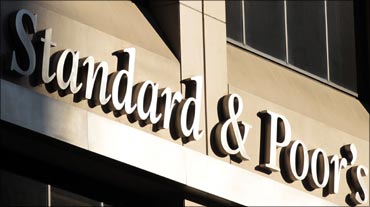
It is the economic equivalent of the Sun shifting its position by a billion miles. That the Sun may well continue to be at the center of the solar system for some time to come is irrelevant; that it was forced to shift is the focal point of the discussion at hand.
The consequences of the Sun shifting -- in the absence of any other historical parallel -- are unclear as is the case with the downgrading of the United States debt by Standard & Poor's on August 5, 2011.
Global economy is now well and truly into unchartered waters; an extraordinary event not witnessed by over three generations of humans.
In a press release on August 5, 2011, Standard and Poor's stated, 'We have lowered our long-term sovereign credit rating on the United States of America to 'AA+' from 'AAA.'
. . .
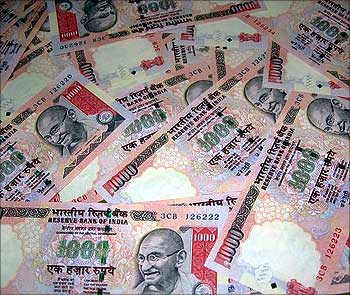
What is more it went on to warn further: 'The outlook on the long-term rating is negative. We could lower the long-term rating to 'AA' within the next two years if we see that there is less reduction in spending than agreed to, and if higher interest rates or new fiscal pressures during the period result in a higher general government debt trajectory than we currently assume in our base case.'
What will be the consequences of this downgrade? Will the interest rates in America go up? Will this trigger a global recession? Or will the dollar depreciate vis-a-vis other currencies? Will the US financial markets, notably its debt and stock markets, collapse?
The answers to these questions are not easy. But surely it will test economists the world over and what they professed for over three decades now.
Unimaginable consequences, terrible cost
The reaction of the world has been on predictable lines. China's state-run Xinhua News Agency on Saturday, in the country's first official response to the downgrade, chastised the US bluntly: 'The US government has to come to terms with the painful fact that the good old days when it could just borrow its way out of messes of its own making are finally gone.'
. . .

Further, it said that China, the largest creditor of the world's sole superpower, has 'every right now' to demand the US to address its structural debt problems and ensure safety of China's dollar assets.
The reason for the same is obvious -- China holds US Treasury securities approximately aggregating to $1.2 trillion.
Similarly, the Japanese are the second largest lender to the US and hold about $900 billion.
With there being no other alternative, the nervousness in Beijing and Tokyo is indeed palpable at this point in time.
. . .
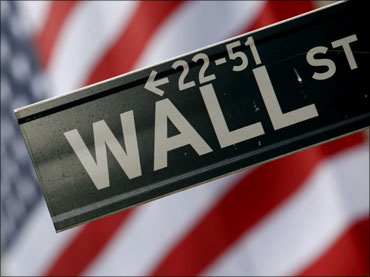
Economists in these countries know for sure that if they say anything negative it would add to the prevailing edginess.
However, if they do not condemn the US and its profligacy, they could soon become the laughing stock. Surely, an unenviable position to be in!
While the Chinese, or for that matter even the Japanese to a limited extent, can curse the Americans or the US economy, remember they can do precious little in these extremely volatile circumstances.
Remember, if they shout from the rooftops they could well hurt themselves further as it is this very country that holds their precious savings in US dollars.
. . .
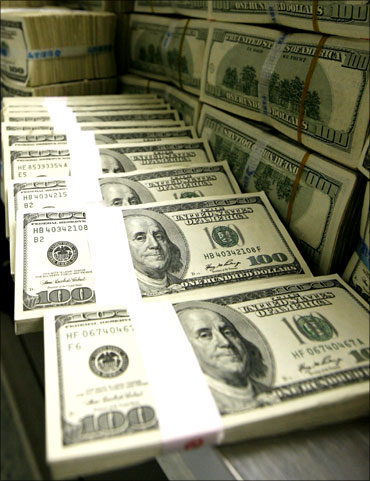
The Chinese and the Japanese might well be kicking themselves now. It is common knowledge that the US debt has increased by over $500 billion each year since 2003, with increases in excess of $1 trillion in 2008, a whopping $1.9 trillion in 2009 (thanks to the financial crisis and the bailout package), and $1.7 trillion in 2010.
As of August 3, 2011, the total debt outstanding was $14.34 trillion, of which approximately $4.56 trillion was held by foreign governments, several of whom are called 'poor' or 'developing' countries. Interesting isn't it?
It is in this connection that Mervyn King, Governor, Bank of England, pointed out that capital has flowed 'uphill' from 'poor' to 'rich' countries. Similarly, Lawrence Summers states that 'the majority of the world's poorest people now live in countries with vast international financial reserves'.
Pointing to the un-sustainability and the inherent political risk of the entire arrangement (where foreign banks refuse to buy US securities or even start selling them heavily) was addressed in a June 2008 report issued by the Bank of International Settlements, which stated, 'Foreign investors in US dollar assets have seen big losses measured in dollars, and still bigger ones measured in their own currency. While unlikely, indeed highly improbable for public sector investors, a sudden rush for the exits cannot be ruled out completely.'
. . .
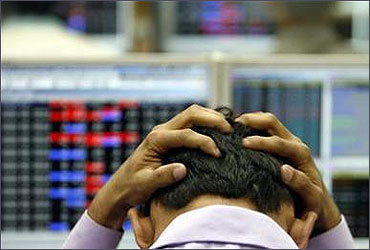
It is in this connection that in my book Global Imbalance and the Impending Dollar Crisis (2007), I had argued that it would take no seer to predict that the collapse of the US dollar could well occur when even a small fraction of the existing holders of the American securities exit the US dollar trade. It would be a stampede out there, I had warned.
The late Iraqi dictator Saddam Hussein was fully aware of this paradigm. Seeking to exploit the inherent weakness of the present arrangement in the global financial architecture and more particularly the US dollar, Saddam wanted to trade his crude oil in Euro, which would have led to a lower demand for the US dollar and thereby trigger a dollar collapse. And those were his 'weapons of mass destruction (WMDs).
At this point in time, it is very clear that the Americans invaded Iraq being fully aware that there were no WMDs. . . the unstated reason for invading Iraq was to prevent Saddam trading in any other currency.
And if he had been allowed to do what he wanted to, the demand for the dollar -- and by extension the value of the US dollar -- would have collapsed then.
. . .
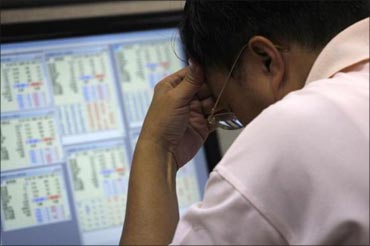
What is indeed worrying for the Americans is the fact that countries till date have invested their foreign exchange reserves in US securities on the premise that these securities are completely risk-free. Surely they will be constrained to take a relook in holding their investments in US securities. This is true for the Reserve Bank of India, too.
Though section 33(6)(i)(a) of the RBI Act is silent on the issue of ratings of the securities, it is plain common sense that no one within the RBI (especially given the prevailing atmosphere in the country) will risk to continue to invest its forex reserves in US securities from now on.
And that could be equally true for other central banks as well. Central banks, by force of habit, might well believe in US securities, but they may be prevented from any further investment by the law of the land in non-AAA rated securities.
Let me also add another dimension to this issue. If some analysts are to be believed, Venezuela and notably Iran too possess, thanks to the oil trade, the very same 'WMDs'.
. . .
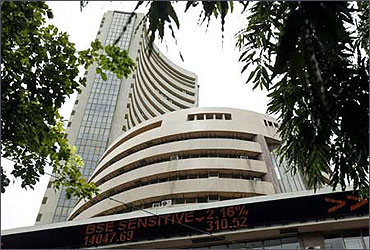
The West has dubbed them rogue nations. They could well seize the opportunity of the US rating downgrade and begin to divest their dollar holdings. This could lead to an unprecedented bloodbath in the global financial markets.
Should that happen the consequences are unimaginable and the costs terrible.
Crisis will expose the economists
While the reactions to the downgrade across the globe pour in even as you read this, the Indian reaction to these developments has been indeed comical. The response of the Union finance minister in an address to the Confederation of Indian Industry on Saturday morning captured this confusion -- within the government -- best.
The finance minister is reported to have stated, "The downgrading of the US sovereign rating will have some implications on India." Yet he says that there is "no need to press panic button as fundamentals of the economy are strong."
. . .
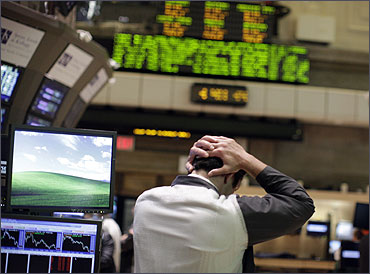
Lest you underestimate the crisis, he says, "There is a crisis." But if you think that the government is perturbed, the finance minister went on to add, "I am not unnecessarily worried. There is no point in pressing the panic button."
Well, this was just hours after the news of the downgrade broke out. Surely a more structured response will follow even from the Indian establishment.
But the crucial question before us remains -- did the world of finance need this communication from Standard & Poor's to inform us that the long-term fiscal outlook for the United States is no longer AAA rated?
Obviously, the answer is a plain and simple 'no'. But establishments the world over have been guilty of ignoring all warnings on the issue.
. . .
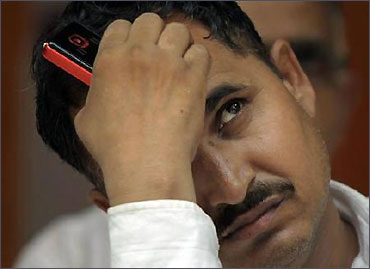
In the alternative they have simply suspended their sense of disbelief. Either way, they stand completely exposed.
Economists, analysts and finance professional who till the other day argued for the US economic model, its currency and its securities will be closely watched. After all, even through the US Titanic has hit the iceberg, it makes economic sense for most countries (barring, of course, the 'rogue nations') not to rock the boat in which they are co-voyagers along side the US.
Remember, this comes on top of a debt crisis in Europe. The world of finance is indeed in an unprecedented crisis -- where even the root assumptions held as gospel for over three decades no longer exist.
But what was not unstated by the finance minister is that in a crisis people do the unexpected. And therein lies the rub. This crisis will expose economists, analysts and finance professionals and their understanding of economics. The time starts now.
The author is a Chennai-based chartered accountant. He can be contacted at mrv@mrv.net.in